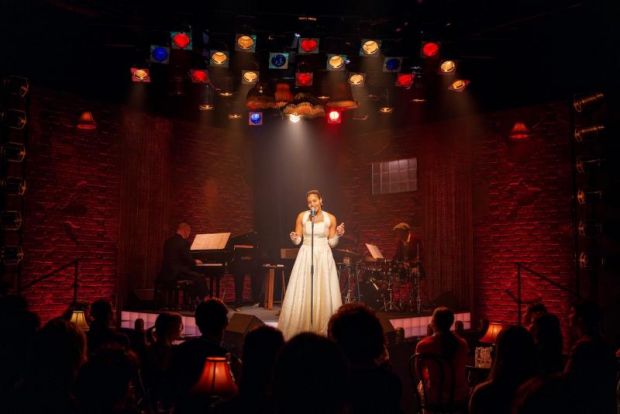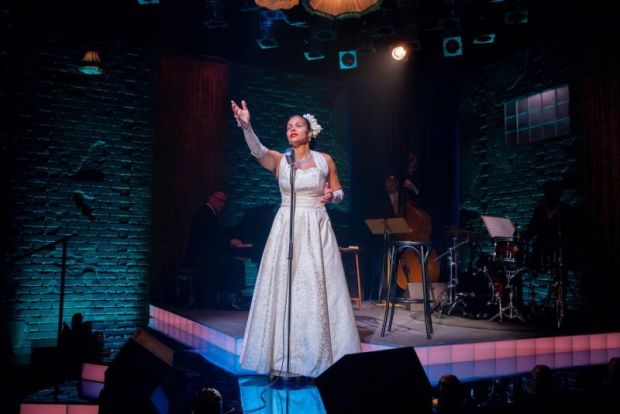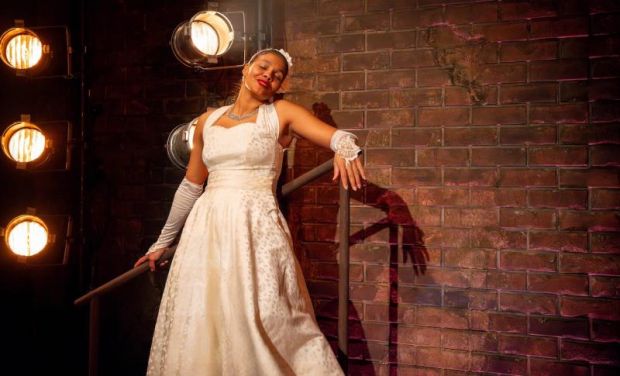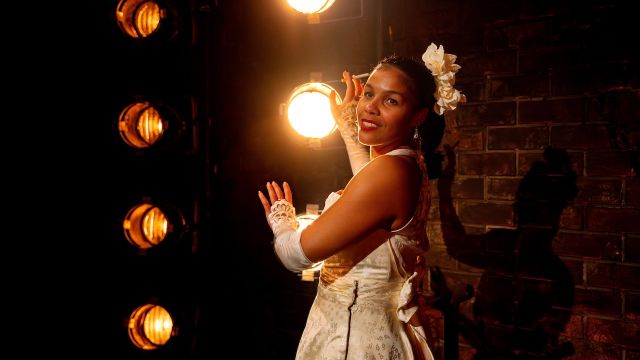Lady Day at Emerson’s Bar & Grill
This remarkable incarnation of Billie Holiday by Zahra Newman lifts beyond that familiar, now surely perverse trope of female singers headed for tragedy. Think Janis Joplin, Judy Garland, Whitney Houston, Amy Whitehouse, and so many stars falling off the stage from drugs, booze or other demons.
It’s 1959 and Billie Holiday is appearing in a small jazz club in Philadelphia for what turns out to be her final performance. Emerson’s is evocatively realised in Belvoir’s corner stage with rough brick walls bathed in crimson light, a high basement window and a cosy space for three musicians, surrounded by cabaret tables and chairs and the whole auditorium under the warm glow of cheap frilly shades.

Flourishing her trademark gardenia (and whisky glass), Billie holds us from the start, so poised in a long ivory dress, shimmering and charismatic.
Written for an Atlanta premiere back in 1986 by Lanie Robertson with musical arranger Danny Holgate, Holiday’s gritty back story is weaved subtly, incidentally, between and through her songs. And Newman perfectly captures Holiday’s distinctive singing, the sweeping jazz rhythm and sudden high emphasis, all etched with feeling, and now scratched by booze and heroin.

After the powerful racial horror of “Strange Fruit”, she escapes backstage for more of both, and her decline accelerates. Most but not all the songs are dark, but Newman’s Holiday colours them with such a range of insightful anecdotes, wit and irony. “God Bless the Child” is as tender as it is damning of her mother and “Tain’t Nobody’s Business If I Do” is as much about her own resilience as a blues homage to her mentor Bessie Smith.
Holiday suffers desertion, childhood rape and segregation, a dud husband leading to heroin addiction and her imprisonment, but this Lady Day still celebrates her huge appeal, forthrightness and worth. Mitchell Butel’s direction (with Newman as associate director) inventively moves us through the episodic moods and surprises, while Newman spills her charisma (and drinks) moving through the audience.

Both are blessed with a smart music trio in pianist Kym Purling (as Jimmy Powers forever shepherding his unpredictable star) and Victor Rounds on double bass and Calvin Welch on drums. All are costumed perfectly to period by designer Ailsa Paterson and so true to her well-worn club, lit by Goven Ruben. The verisimilitude of this whole production, topped by Zahra Newman, transports us back to this jazz cabaret, and not just to another juke box musical.
Martin Portus
Photographer: Matt Byrne
Subscribe to our E-Newsletter, buy our latest print edition or find a Performing Arts book at Book Nook.

